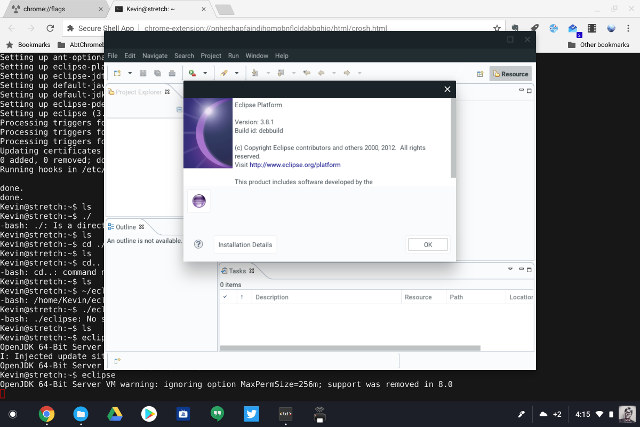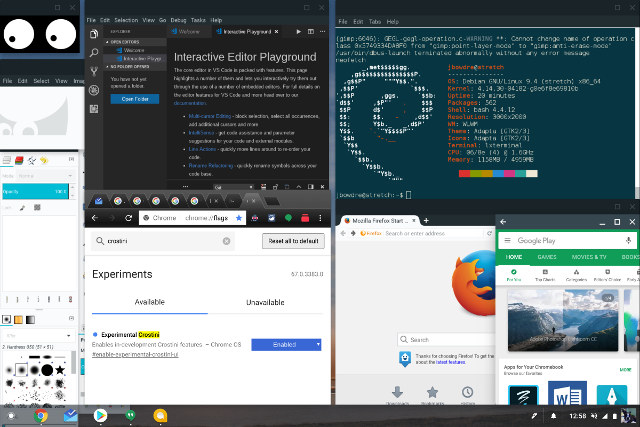Ever since the first Chromebooks were released, it has been possible to run Ubuntu or other Linux distributions using Crouton (Chromium OS Universal Chroot Environment) on Chrome OS devices, but that requires to enable developer mode, which disables some of security features that come with Chrome OS.
Google has now make it easier and safer with Crostini VM that does not require developer mode. The only downsides for now are that it only works on Google Pixelbook, and you need to install/run Chrome OS v67 dev channel with the #enable-cros-container flag enabled.

Using Crostini is fairly straightforward. First start crosh terminal with Ctrl++Atl+t, and running the following command to create a VM, and launch a container:
|
1 2 |
vmc start dev run_container.sh --container_name=stretch --user=<username> --shell |
This will start a Debian Stretch environment with networking and GUI support, so you can install & run programs like you would in Debian (e.g. apt install htop).
Kevin Tofel at AboutChromebooks managed to install the Eclipse IDE (See screenshot above) and Sublime Text using the VM in order to write code with his Chromebook, while John Bowdre showed he installed Visual Studio Code, Gimp, Firefox, and apparently Chromium browser because… he could.

Crostini VM does not cover all use cases for now, as for example USB is not currently supported, and the VM is apparently taking a lot of memory, so Chromebook with 4GB RAM may not be usable with Crostini at this stage. Nevertheless it’s still an experimental feature, and things should improve over time.
Chromebooks may soon become much more interesting laptops, as beside running an operating systems to basically browse the web, they can now run Android apps, and upcoming support for Linux programs could be a game changer.
Via Liliputing

Jean-Luc started CNX Software in 2010 as a part-time endeavor, before quitting his job as a software engineering manager, and starting to write daily news, and reviews full time later in 2011.
Support CNX Software! Donate via cryptocurrencies, become a Patron on Patreon, or purchase goods on Amazon or Aliexpress





Maybe im not in the targeted user group anyways but…
I would prefer things go the other way round like linux with chromeos/android runtime. But well let’s see how things develop 😉
On a related note, just wanted to say that Chromebrew turns chromebooks into very functonal Linux consoles.
Thanks for that @blu
Hadn’t hear of it! 🙂
Np. I learned about it only recently myself, and I was surprised how useful it was and how easy it could turn a goodledocs machine into a full-fledged linux terminal.
If actual cheap Chromebooks can run Crouton well, Why not let the users install it and not in developer mode instead of making something that is worse in terms of performance, than the Gnu/Linux in chroot?.
Perhaps, to be more secure, to let install Crouton “lite”i n non developer mode only from Google repositories, with a debian rolling release distribution near to their own one, will be a much better option.
Google has officially announced Linux programs support for Chromebooks @ https://www.blog.google/products/chromebooks/linux-on-chromebooks/
Not many extra details in the announcement though.
18 Chromebooks are supported by Crostini VM according to https://www.xda-developers.com/apollo-lake-chromebooks-acer-asus-lenovo-dell-linux-app/
Partial list:
Lenovo Thinkpad 11e Chromebook / Lenovo Thinkpad Yoga 11e Chromebook (Pyro)
Lenovo 500e Chromebook (Robo360)
Lenovo 100e Chromebook (Robo)
Acer Chromebook Spin 11 R751T (Electro)
Acer Chromebook 15 CB515-1HT/1H (Sand)
Acer Chromebook 11 (C732, C732T, C732L & C732LT ) (Astronaut)
Acer Chromebook 11 (CB311-8H & CB311-8HT) (Santa)
Acer Chromebook Spin 11 (CP311-1H & CP311-1HN) (Lava)
ASUS Chromebook Flip C213SA (Reef)
Dell Chromebook 11 5190 (Nasher)
Dell Chromebook 11 2-in-1 5190 (Nasher360)